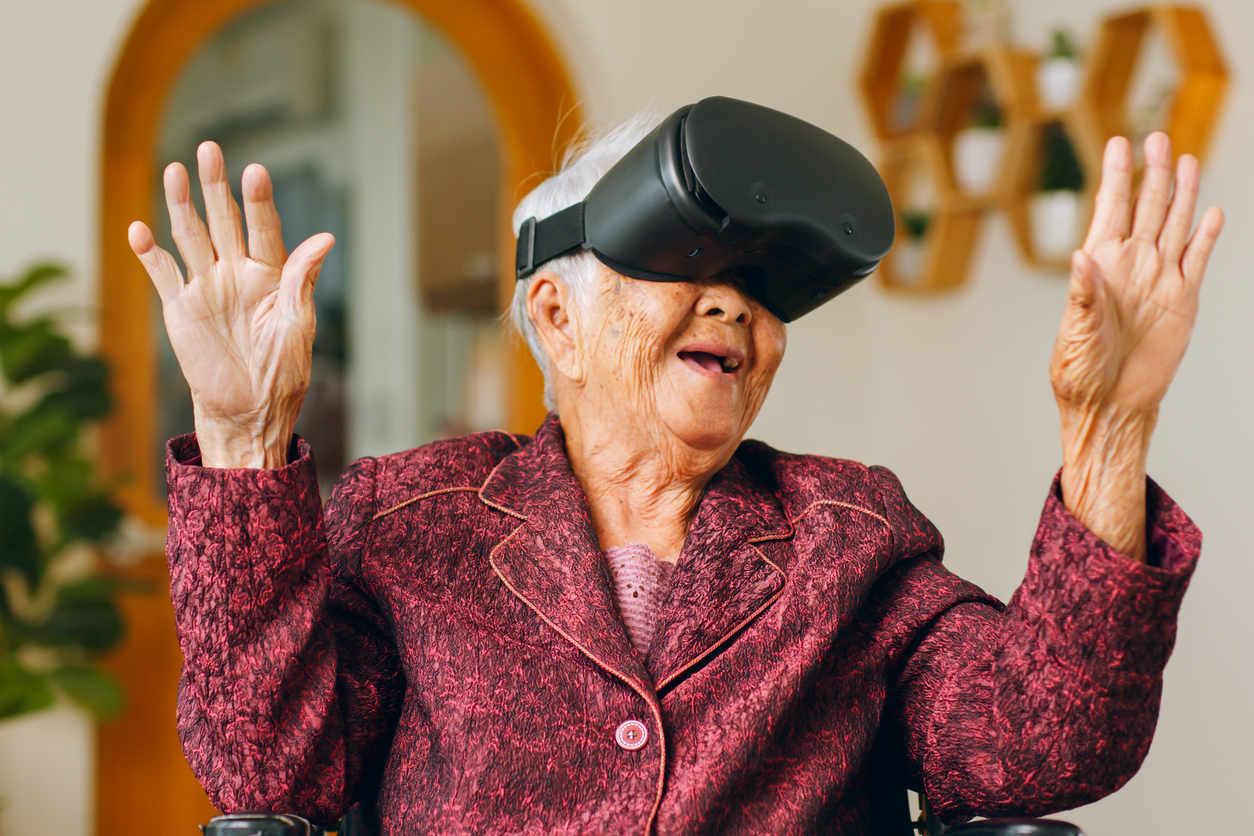2025-04-08
Can VR tip the balance?
Neurology
#Parkinsons #VR #Rehabilitation #Balance
#Exergaming
In patients with Parkinson’s disease (PD), balance disorders are among the most disabling symptoms. Linked to impaired postural control, coordination, and fine motor skills, they significantly increase the risk of falls, leading to injury, loss of independence, and a marked decline in quality of life. These balance impairments are often resistant to pharmacological treatment and require targeted rehabilitation strategies.
Conventional physiotherapy—based on muscle strengthening, stretching, or gait training—is the cornerstone of this management. However, its long-term effectiveness is often limited due to poor adherence, lack of motivation, or insufficient sensory stimulation.
In this context, virtual reality (VR) is emerging as a promising alternative. By creating an immersive, interactive, and engaging environment, it actively stimulates patients' motor and sensory capacities while enhancing engagement and promoting neuroplasticity. VR could therefore reinforce the benefits of traditional rehabilitation or even serve as a complementary solution at home or in specialized centers.
The impact of virtual reality on balance in Parkinson’s patients has been assessed both alone and in combination with conventional rehabilitation. Eleven randomized controlled trials, including 518 patients with a mean age of 67.3 years, were analyzed. The protocols varied in duration (4 to 12 weeks), frequency (2 to 5 sessions per week), and type of technology used (Wii Balance Board, Kinect, immersive or semi-immersive systems, etc.).
The results show that VR, whether used alone or in addition to standard therapy, significantly improves balance. Although the effect is moderate, it is clinically meaningful, suggesting a real impact on patients’ functional stability. However, the considerable heterogeneity of the studies—regarding duration, frequency, and technology—tempers the robustness of the conclusions.
Some studies that combined VR with conventional exercises reported superior outcomes compared to either approach alone. The most notable improvements involved dynamic balance, postural stability, and functional capabilities. In some cases, the gains reached or exceeded the minimal detectable change threshold, reinforcing their clinical relevance.
Parkinson’s disease is a progressive neurodegenerative disorder often marked by balance disorders that significantly increase the risk of falls. These postural impairments severely impact patient autonomy and quality of life. One of today’s major challenges is to develop rehabilitation strategies that are effective, engaging, and adaptable—especially when conventional treatments begin to show limited efficacy.
This study explores the potential of virtual reality, alone or in combination with conventional exercises, to improve balance in patients with Parkinson’s disease. The goal: to assess whether VR can become a fully-fledged therapeutic tool in functional management. The results demonstrate a significant improvement in balance scores, particularly when VR is integrated into standard rehabilitation. Its interactive and engaging nature makes it an attractive option that may boost adherence and enhance postural stability outcomes.
Larger-scale trials with standardized protocols and long-term follow-up will be needed to confirm these findings. Future challenges will include identifying the patient profiles most likely to benefit and tailoring VR programs accordingly, to integrate unctional rehabilitation routines.them into f Ultimately, VR could become a powerful lever to prevent falls, preserve autonomy, and improve quality of life in Parkinson’s disease.
In patients with Parkinson’s disease (PD), balance disorders are among the most disabling symptoms. Linked to impaired postural control, coordination, and fine motor skills, they significantly increase the risk of falls, leading to injury, loss of independence, and a marked decline in quality of life. These balance impairments are often resistant to pharmacological treatment and require targeted rehabilitation strategies.
Conventional physiotherapy—based on muscle strengthening, stretching, or gait training—is the cornerstone of this management. However, its long-term effectiveness is often limited due to poor adherence, lack of motivation, or insufficient sensory stimulation.
In this context, virtual reality (VR) is emerging as a promising alternative. By creating an immersive, interactive, and engaging environment, it actively stimulates patients' motor and sensory capacities while enhancing engagement and promoting neuroplasticity. VR could therefore reinforce the benefits of traditional rehabilitation or even serve as a complementary solution at home or in specialized centers.
VR: regaining balance?
The impact of virtual reality on balance in Parkinson’s patients has been assessed both alone and in combination with conventional rehabilitation. Eleven randomized controlled trials, including 518 patients with a mean age of 67.3 years, were analyzed. The protocols varied in duration (4 to 12 weeks), frequency (2 to 5 sessions per week), and type of technology used (Wii Balance Board, Kinect, immersive or semi-immersive systems, etc.).
The results show that VR, whether used alone or in addition to standard therapy, significantly improves balance. Although the effect is moderate, it is clinically meaningful, suggesting a real impact on patients’ functional stability. However, the considerable heterogeneity of the studies—regarding duration, frequency, and technology—tempers the robustness of the conclusions.
Some studies that combined VR with conventional exercises reported superior outcomes compared to either approach alone. The most notable improvements involved dynamic balance, postural stability, and functional capabilities. In some cases, the gains reached or exceeded the minimal detectable change threshold, reinforcing their clinical relevance.
Read next: The use of Immersive Virtual Reality would be effective against Mild Cognitive Disorders
Toward enhanced rehabilitation?
Parkinson’s disease is a progressive neurodegenerative disorder often marked by balance disorders that significantly increase the risk of falls. These postural impairments severely impact patient autonomy and quality of life. One of today’s major challenges is to develop rehabilitation strategies that are effective, engaging, and adaptable—especially when conventional treatments begin to show limited efficacy.
This study explores the potential of virtual reality, alone or in combination with conventional exercises, to improve balance in patients with Parkinson’s disease. The goal: to assess whether VR can become a fully-fledged therapeutic tool in functional management. The results demonstrate a significant improvement in balance scores, particularly when VR is integrated into standard rehabilitation. Its interactive and engaging nature makes it an attractive option that may boost adherence and enhance postural stability outcomes.
Larger-scale trials with standardized protocols and long-term follow-up will be needed to confirm these findings. Future challenges will include identifying the patient profiles most likely to benefit and tailoring VR programs accordingly, to integrate unctional rehabilitation routines.them into f Ultimately, VR could become a powerful lever to prevent falls, preserve autonomy, and improve quality of life in Parkinson’s disease.
Read next: MoCA boosted, brain relieved!

Last press reviews
Birch allergy: could one shot change everything?

#AllergicRhinoconjunctivitis #IgG4 #Allergoid #BirchPollen #Immunotherap...
Allergies: could the gut hold the key?

#SeasonalAllergicRhinitis #Probiotics #Prebiotics #GutMicrobiota...
Parkinson’s disease: bone health shouldn’t be overlooked

#ParkinsonsDisease #Osteoporosis #FractureRisk #FRAX #Prevention...